A few months back, a reader asked a question about Resident Evil 5. I can’t remember who asked or what the exact question was, but I think it was something like this:
In Resident Evil 5 there’s a scene where the main villain says “Your future hinges upon this fight” just before he kicks you through a door that breaks. What did this say in Japanese?
I haven’t played the game but it wasn’t too hard to find this scene in both English and Japanese, so let’s take a look. Here are screenshots from this scene:
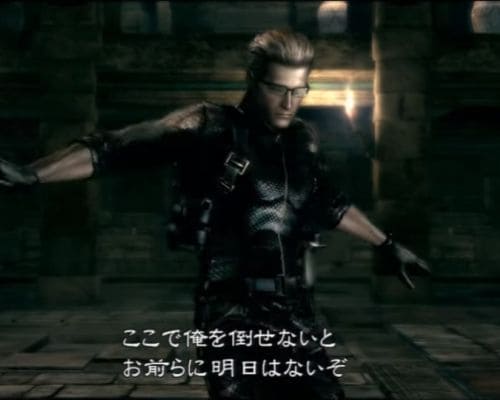 | 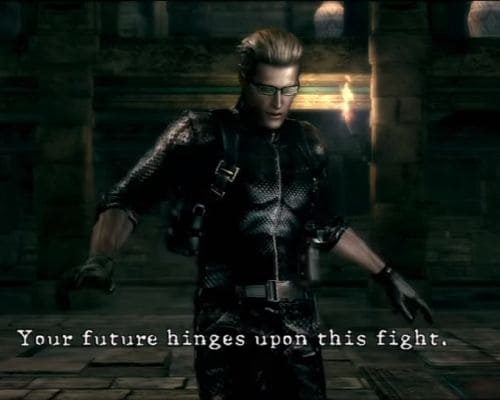 |
And here’s the text in each version:
| Japanese Version (basic translation) | English Version |
| You have no tomorrow if you can’t defeat me here. | Your future hinges upon this fight. |
And if you’d like to see the actual scenes in action, I put this all into a video here:
From this, we can see that the Japanese line doesn’t involve a pun or any comedy. This isn’t too surprising – sappy one-liners are a staple of American action movies, TV, and other entertainment. This isn’t always so in Japanese entertainment, though, which usually handles such situations in a more straightforward manner. So when English one-liners are translated into Japanese, it’s common for them to be localized into normal, straightforward lines. And going the other direction, normal, straightforward lines in Japanese are often given added personality when localized into English.
It’s important to note that this adding and removing of sarcasm isn’t always the case – it’s just a common phenomenon. Much of my own experience with this comes from my work on Japanese movies and TV shows, as well as seeing movies and television shows translated into Japanese. I don’t often see it in games because I seldom play English games localized into Japanese, so this is a real treat. I’d love to check out similar examples from other games, so if you can think of any memorable sarcastic one-liners let me know! (Also share any door puns you can think of)


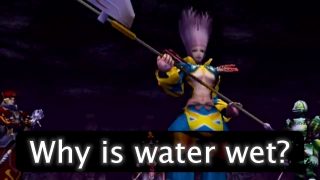
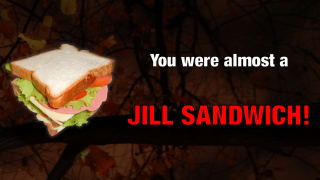
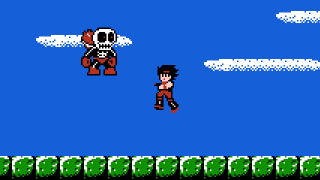
I absolutely adoor puns. They’re my jam, especially when they make me slam my desk with laugh-door. It’s easy to get a handle on them, all you have to do is not be so close-minded. Soon your world will be turned sideways and the way will be open to see the light.
Comment 9/10. Could use more door puns. 😀
Here’s something I always wanted to know. What did Hong Kong 97’s infamous intro say in Japanese?
If you can link me to an image or video of what you mean I can take a look. I thought the intro was already in English, or at least that’s what I see from a quick YouTube search. The game appears to be Chinese-made though, so I’d be surprised if there’s much if any Japanese.
It’s Japanese-made, and the game can be played in both English, Chinese and Japanese. The “infamous” bit is the one that says “The year 1997 has arrived. A herd of fuckin’ ugly reds are rushing from the mainland.” in English, which is “1997年がやってきた。大陸から薄汚い人民が痰を吐きながら大挙して押し寄せくる。” in Japanese.
So something like “The year 1997 has arrived. Dirty members of the people are coming from the continent in droves, hawking up phlegm as they go.” Not really all that different in tone.
As a side note, I believe I heard from someone that the word “人民” (“jinmin”, lit. “the people”) has heavy communist connotations in the Japanese language, and is heavily exclusively associated with the Mainland Chinese government (and North Korea to an extent) within Japanese society. Can you confirm for sure, Tomato?
Also interesting to note the “Japanese” name for Happysoft (吉喜軟体公司) uses “公司”, which is actually a CHINESE word for “company”. And when the word is used in a Japanese-language context (pronounced “koushi”), it refers specifically to CHINESE companies. THAT part I can confirm (Hey, here’s a fun game for any of you reading this: next time you look at an anime’s ending credits (preferably written in Japanese), check for any companies ending in “-公司” (especially any “-有限公司”s). That will usually indicate that at least part of the show’s animation was outsourced to China (they’ve been doing it for a really long time))
Also, here’s a document that I did a while ago comparing all of the Japanese, Chinese, and English text of this infamous game: https://docs.google.com/document/d/1rHeDqGSpZZ2Tzxc_2QiehJw4nVqRiB_uhs1iyGJaPSM/edit?usp=sharing . I even included a comparison of the advertisement before the intro, as well as a look at the end credits (the credits are always the same Japanese text regardless of which language is chosen beforehand)
I think that this game probably deserves an comparison article’s attention on this site, seeing as there really isn’t all that much text in this whole game to begin with and can probably be quickly looked at in a few minutes or so. Please consider it, Clyde, if you can (PS: I know you probably can’t vouch for the Chinese text the same way you can for the Japanese and English, but from what I heard from a few native Chinese speakers, the Chinese usage is really grammatically incorrect and awkwardly-worded)
Addendum to this comment about a detail I forgot:
Despite my statements about HappySoft, the fact that “公司” was used in their company name is more likely a simple joke targeted at the Chinese people, rather than HappySoft genuinely being a Chinese company (apparently, the game has been programmed entirely by one person living in Japan, a journalist nicknamed “Kowloon Kurosawa” (クーロン黒沢), and I don’t think anyone knows his real name, not even Japanese Wikipedia)
My understanding is that 人民 (“the people”) is pretty much on the same level as “comrade” in English, where the word itself is technically neutral enough, but your mind is going to wander in a certain direction when you see it.
It’s the same “the people” as in The People’s Republic of China and a bunch of other communist China-related terms.
Here’s a link: http://michaelgoraku.blog22.fc2.com/blog-entry-23.html
There’s an article about the game on Hardcore Gaming 101 which seems to have an English intro, is that translated?
http://www.hardcoregaming101.net/hongkong97/hongkong97.htm
Basically, let’s kill us some commies.
That’s the in-game text if you set the game’s language to English.
The Japanese text more or less says the same, though.
So is this like the inverse of how Final Fantasy games tend to be more comical and silly than their English counterparts?
Except for IV, I haven’t really looked into the English localizations too extensively. But if the English versions are known for being a little sillier then this probably plays a large role in the difference.
Well, at least the original localization of FFVI proves that’s not the case, which is full of silliness where the Japanese original plays it straight. A great example: http://legendsoflocalization.com/son-of-a-submariner-kefkas-famous-line-in-detail/
Instead of only toning down the language for family friendly NOA they often went with cheesy one-liners.
It’s a bit broader than a one-liner, but, in the original Ratchet & Clank, when our heroes first meet the plumber (who is bending over and working), Ratchet says “look, plumber’s crack.” The plumber hears him and says “what did you just say?,” to which Ratchet responds “I said ‘look, the plumber’s back.'” Witty and punny and couldn’t possibly play the same in Japanese, I’d expect.
( https://www.youtube.com/watch?v=Sk5Qkfvqm6w )
I checked and it basically goes like:
Whoa, what a big butt!
What did you say?!
Err, I said “what a big voice” (big voice = loud voice in Japanese)
Have to give them credit for the attempt, anyhow. Do the relevant Japanese words for “butt” and “voice” sound at all similar?
Apropos of nothing, some of the Japanese commercials for Ratchet & Clank: Going Commando are amazing: https://www.youtube.com/watch?v=8jEKwrbbLKQ
“ketsu” and “koe”, so they both start with k and have two syllables.
That’s something I guess. Got any Jak and Daxter examples as well? I do remember this one scene though that while not necessary comical, actually used the in-game precursor alpahabet in the subtitles when the Oracle tells the story about Hora-Quan (Metal Heads) in Mar’s Tomb.
My favorite door pun is in Companions of Xanth, where you can pick up a slightly open door, carry it around and put stuff into it. Because the door was ajar, you see.
Now THAT’s a game that would be hell to localize, being completely about puns. How would you explain in another language that kicking a bucket in this game causes you to die? ^_^;
Whoa, that sounds really cool. I’ve never heard of this. A quick search turned up this: http://mixi.jp/view_bbs.pl?comm_id=54402&id=2927038 One commenter in there describes playing it with dictionary in hand but that it was a battle with English.
It’s a linguistic struggle even for native speakers. Anthony’s books are known for their non-stop pun barrage, and the game is, if anything, even MORE pun-centric. Very many puzzles require you to torture the language in peculiar ways to solve them.
This gets me wondering about many lines I’ve heard in many of my favorite films. Like, in Disney’s “Aladdin”, Aladdin at one point says “Better check your crystal ball again, Jafar!”. Gets me wondering what that particular line is in Japanese (I couldn’t find that Japanese clip on Youtube, but it’s on NicoNico).
Speaking of English games translated in Japanese, I have seen on Nicovideo that Undertale got a Japanese translation.
(I love seeing reactions from people playing Undertale in case you wonder.)
One of the thing I noticed is that when Sans is counting, … is counting, …
Well, those who know the game well know what I am talking about! XD
Anyway, when he wonder if he should use ” quice? frice?”,
in the Japanese version he instead wonder about which version of the number four he should use. XD
Anyway, if you played the game, maybe you should have a look as well? ^^
Now that I think about it, there is an optional conversation where Sans mention a laboratory.
Papyrus hear it as “Labradoratory” or something like that and then ask if it mean there is a dog inside.
Sans then say it might be a possibility.
I wonder how they handled that dialogue. Maybe they went with Katakana for the pun?
Mato, if you go ahead and do movie comparisons, please focus on cheesy Arnie movies.
I want to know how to say every one liner from Commando in Japanese.